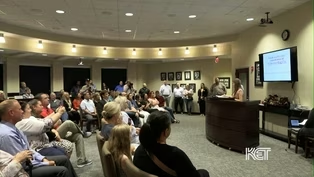
Autism Advocacy
Clip: Season 1 Episode 257 | 3m 31sVideo has Closed Captions
High school senior cultivates understanding through advocacy club.
High school senior cultivates understanding through advocacy club.
Problems playing video? | Closed Captioning Feedback
Problems playing video? | Closed Captioning Feedback
Kentucky Edition is a local public television program presented by KET

Autism Advocacy
Clip: Season 1 Episode 257 | 3m 31sVideo has Closed Captions
High school senior cultivates understanding through advocacy club.
Problems playing video? | Closed Captioning Feedback
How to Watch Kentucky Edition
Kentucky Edition is available to stream on pbs.org and the free PBS App, available on iPhone, Apple TV, Android TV, Android smartphones, Amazon Fire TV, Amazon Fire Tablet, Roku, Samsung Smart TV, and Vizio.
Providing Support for PBS.org
Learn Moreabout PBS online sponsorshipLeila Coburn was diagnosed with autism at the age of five, but now she's graduating from high school and hasn't let her disability keep her from making an impact in her community.
When I first entered high school, I wasn't even speaking to people.
I didn't know.
It was just too anxiety provoking for me.
So it was really hard.
But I wrote a piece about autism and in my creative writing class and seeing the impact that that had, I was like, Wow, maybe I could really, like, do something with this.
And so I started getting more and more involved in advocacy, more and more comfortable with it.
What I thought was really missing was like community, because isolation is really common for disabled people and especially in the autism community and like, it's really hard to make friends.
And so of course, my first goal with the Disability Advocacy Club was to have somewhere where we could focus on accessibility initiatives.
But it was also just to have a space where everybody was understand each other.
I make fliers on various topics pertaining to autism.
It's designed for the parent so that they can parents of autistic children so that they can get the perspective of an autistic person.
And the other big thing that we've done has had a huge impact is we do presentations to autistic parents and therapist so or parents of autistic children and they can submit any questions they want about autism that they have for me.
And I think it's just been really rewarding to see the impact that having access to like an autistic person and to just like kind of build that relationship.
So the Silent disco was specifically designed to accommodate the needs of disabled people, so we ensured it was mobility aid and wheelchair accessible.
And we also a big part of it was we had headphones in which you could connect to the music.
So you walk in, you get a pair of headphones and there are several different channels you can tune into.
And so that means all the and we had no, we didn't have flashing lights.
So that means you walk in and if you want to listen to music, you can't you don't want to listen to music, You don't have to.
And we also had, you know, areas where people could regulate themselves if they needed or if they had a medical episode, they could go to.
So we had a sensory area.
We also had a board game area, and we ensured that the staff members who were there were compassionate and trained in various areas and we also had to accommodate allergies.
Food stayed in one place and we had allergy friendly food and it went really well.
And I really think it impacted a lot of people's lives.
Never underestimate the ability of friendship to like, change somebody's life because that I've seen so many lives changed to like the Disability Advocacy Club, but also things like the silent disco.
People don't think about that, but like having that ability to like, be with your peers and to just like, just have a night with your peers that changes people's lives because for once they're being considered and it's their needs too.
And so that's what we want to do, and that's what we've done with the Disability Advocacy Club is give people the ability to go to things that they wouldn't be able to go to otherwise.
And the thing is, I believe that every person with autism has something to give, Like I truly believe that.
And so you just I mean, four, eight, four years ago and eight years ago, my parents would not have believed nobody would have believed it would be possible for me to be where I am, but with the right support I am so just, you know, get people with autism a chance.
Don't be afraid to like, you know, open your world perspective.
Leila will be attending Center College, where she has earned a full ride as a Lincoln scholar.
Video has Closed Captions
Clip: S1 Ep257 | 2m 42s | Somerset's 10th annual investor panel. (2m 42s)
Providing Support for PBS.org
Learn Moreabout PBS online sponsorship
- News and Public Affairs

Top journalists deliver compelling original analysis of the hour's headlines.

- News and Public Affairs

FRONTLINE is investigative journalism that questions, explains and changes our world.












Support for PBS provided by:
Kentucky Edition is a local public television program presented by KET
